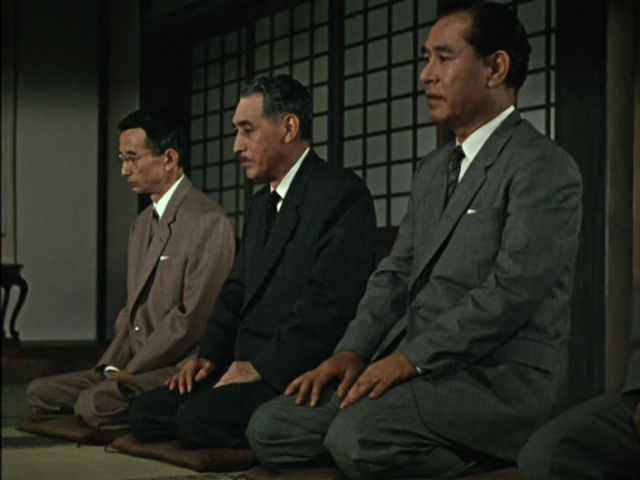LATE AUTUMN (AKIBIYORI) (Yasujirō Ozu, 1960)
Film Forum
209 West Houston St.
Tuesday, June 25, 1:00, 3:20, 8:00
Series runs through June 27
212-727-8110
www.filmforum.org
 Yasujirō Ozu revisits one of his greatest triumphs, 1949’s Late Spring, in the 1960 drama Late Autumn, the Japanese auteur’s fourth color film and his third-to-last work. Whereas the black-and-white Late Spring is about a widowed father (Chishu Ryu) and his unmarried adult daughter (Setsuko Hara) contemplating their futures, Late Autumn deals with young widow Akiko Miwa (Hara again) and her daughter, Ayako (Yoku Tsukasa). At a ceremony honoring the seventh anniversary of Mr. Miwa’s death, several of his old friends gather together and are soon plotting to marry off both the younger Akiko, whom they all had crushes on, and twenty-four-year-old Ayako. The three businessmen — Soichi Mamiya (Shin Saburi), Shuzo Taguchi (Nobuo Nakamura), and Seiichiro Hirayama (Ryuji Kita) — serve as a kind of comedic Greek chorus, matchmaking and arguing like a trio of yentas, while Akiko and Ayako maintain creepy smiles as the men lay out their misguided, unwelcome plans. Mamiya makes numerous attempts to fix Ayako up with one of his employees, Shotaru Goto (Keiji Sada), but Ayako wants none of it, preferring the freedom and independence displayed by her best friend, Yoko (Yuriko Tashiro), who represents the new generation in Japan. At the same time, their matchmaking for Akiko borders on the slapstick. Based on a story by Ton Satomi, Late Autumn, written by Ozu with longtime collaborator Kôgo Noda, is a relatively lighthearted film from the master, with sly jokes and playful references while examining a Japan that is in the midst of significant societal change in the postwar era. Kojun Saitô’s Hollywood-esque score is often bombastically melodramatic, but Yuuharu Atsuta’s cinematography keeps things well grounded with Ozu’s trademark low-angle, unmoving shots amid carefully designed interior sets. Late Autumn is downright fun to watch, and you can see it on June 25 at Film Forum as part of its three-week Ozu series, which continues through June 27 with screenings of such other works as An Autumn Afternoon, That Night’s Wife, the double feature A Hen in the Wind and Ohayo, and Where Now Are the Dreams of Youth? In addition, on June 26 at 11:00 am, Film Forum will host a free memorial tribute to Japanese cinema expert, critic, director, and curator Donald Richie, who died in Tokyo in February at the age of eighty-eight; speakers include Ian Buruma, Daryl Chin, Emilie de Brigard, Lucille Carra, Bruce Goldstein, Peter Grilli, Laurence Kardish, Stephen Prince, Mary Richie, and Paul Schrader. (Late Autumn will be having encore screenings July 24-25 as part of Film Forum’s “Reprise Presentation” of eight of the films through July 25.)
Yasujirō Ozu revisits one of his greatest triumphs, 1949’s Late Spring, in the 1960 drama Late Autumn, the Japanese auteur’s fourth color film and his third-to-last work. Whereas the black-and-white Late Spring is about a widowed father (Chishu Ryu) and his unmarried adult daughter (Setsuko Hara) contemplating their futures, Late Autumn deals with young widow Akiko Miwa (Hara again) and her daughter, Ayako (Yoku Tsukasa). At a ceremony honoring the seventh anniversary of Mr. Miwa’s death, several of his old friends gather together and are soon plotting to marry off both the younger Akiko, whom they all had crushes on, and twenty-four-year-old Ayako. The three businessmen — Soichi Mamiya (Shin Saburi), Shuzo Taguchi (Nobuo Nakamura), and Seiichiro Hirayama (Ryuji Kita) — serve as a kind of comedic Greek chorus, matchmaking and arguing like a trio of yentas, while Akiko and Ayako maintain creepy smiles as the men lay out their misguided, unwelcome plans. Mamiya makes numerous attempts to fix Ayako up with one of his employees, Shotaru Goto (Keiji Sada), but Ayako wants none of it, preferring the freedom and independence displayed by her best friend, Yoko (Yuriko Tashiro), who represents the new generation in Japan. At the same time, their matchmaking for Akiko borders on the slapstick. Based on a story by Ton Satomi, Late Autumn, written by Ozu with longtime collaborator Kôgo Noda, is a relatively lighthearted film from the master, with sly jokes and playful references while examining a Japan that is in the midst of significant societal change in the postwar era. Kojun Saitô’s Hollywood-esque score is often bombastically melodramatic, but Yuuharu Atsuta’s cinematography keeps things well grounded with Ozu’s trademark low-angle, unmoving shots amid carefully designed interior sets. Late Autumn is downright fun to watch, and you can see it on June 25 at Film Forum as part of its three-week Ozu series, which continues through June 27 with screenings of such other works as An Autumn Afternoon, That Night’s Wife, the double feature A Hen in the Wind and Ohayo, and Where Now Are the Dreams of Youth? In addition, on June 26 at 11:00 am, Film Forum will host a free memorial tribute to Japanese cinema expert, critic, director, and curator Donald Richie, who died in Tokyo in February at the age of eighty-eight; speakers include Ian Buruma, Daryl Chin, Emilie de Brigard, Lucille Carra, Bruce Goldstein, Peter Grilli, Laurence Kardish, Stephen Prince, Mary Richie, and Paul Schrader. (Late Autumn will be having encore screenings July 24-25 as part of Film Forum’s “Reprise Presentation” of eight of the films through July 25.)
